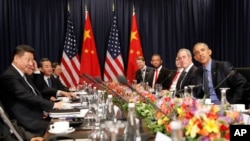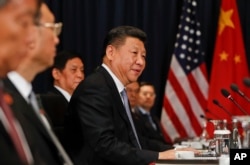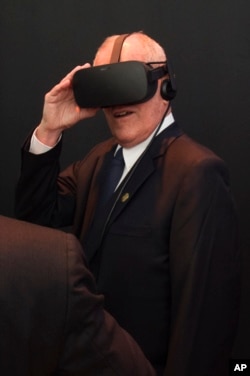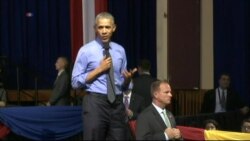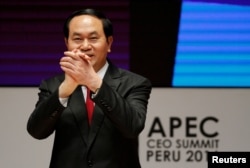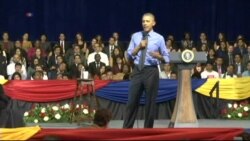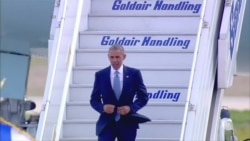Several leaders at a major international summit in Peru called Saturday on the United States and other nations not to abandon global trade deals.
At a time when Americans and European voters are electing politicians who are deeply skeptical that the trade deals actually benefit their own citizens, leaders at the Asia-Pacific Economic Cooperation summit urged countries not to back away from freer trade.
Chinese President Xi Jinping, who held bilateral talks with U.S. President Barack Obama on Saturday, urged countries to embrace economic openness.
"We ought to commit ourselves to build a community with a shared future," Xi said at the gathering in Lima. "And that should oblige us to come closer together than move apart."
'Hinge moment'
Referring to the recent U.S. election of Donald Trump, Xi said Beijing and Washington were at a "hinge moment" in their relations.
"I hope the two sides will work together to focus on cooperation, manage our differences, and make sure there is a smooth transition in the relationship and that it will continue to grow going forward," Xi said.
Obama echoed those sentiments. He praised the two countries' on their effective partnership on such global challenges as preventing Iran from obtaining nuclear weapon, opposing North Korea's nuclear provocations and trying to end the Ebola epidemic.
"In particular, the United States and China have played a pivotal role in pressing the world to act on climate change," Obama added. "Now we face the work of making sure our economies transition to become more sustainable."
China wants regional countries to embrace an economic trade pact known as the FTAAP (Free Trade Area of the Asia-Pacific). That plan is widely seen as a competitor to the U.S.-backed Trans-Pacific Partnership, which now must be ratified by the 12 countries that negotiated the deal.
Trade deal viability
But with Trump vowing to scrap the TPP, its viability is seriously in doubt.
China had its largest delegation ever in attendance at the APEC summit, a sign many delegates saw as China wanting to take the lead on free trade if the U.S. were to turn toward protectionism.
New Zealand's Prime Minister John Key called for making small changes to the TPP to appease Trump, or to create a new trade deal that excludes the United States.
"Even if the United States doesn't want to engage in free trade, President Trump needs to know other countries do," Key said.
Mexico's President Enrique Pena Nieto defended the NAFTA trade deal, struck with the United States in 1992, saying it had benefited workers on both sides of the border. However, he said, Mexican authorities are open to discussing the deal to "modernize" it.
Obama, who is on the final leg of his last foreign trip as president, has been working to reassure leaders about the incoming president.
"We're going to have a busy agenda at APEC, but this is always a useful occasion for us to get together and examine how we can make sure that we're creating more jobs, more opportunity and greater prosperity for all of our countries," Obama told reporters in Lima.
Obama also held talks Saturday with Peruvian President Pedro Pablo Kuczynski. The two discussed a desire for open markets, responsible stewardship of the environment, and respect for democracy and human rights.
WATCH: Obama in Peru: 'Democracy Can Be Frustrating'
Earlier Saturday, in speaking at a town-hall event with Peruvian youth, Obama further sought to ease concerns about Trump, saying, "Don't just assume the worse. Wait until the administration is in place" before drawing conclusions.
Referencing the recent U.S. election, he told the gathering of young people that "democracy can be frustrating."
Vietnamese President Tran Dai Quang closed the summit Saturday, inviting participants to his nation, which is hosting the 2017 meeting.
Foreign policy
Obama had made a focus on Asia and the Pacific, the so-called Asia-Pacific rebalance, the cornerstone of his foreign policy, but that could change substantially after he leaves office in nine weeks.
The president and his free-trade allies have pushed hard for years to put the TPP agreement into action. But on the campaign trail, the Republican nominee suggested he would disengage from Asia, was highly critical of some U.S. allies and called the TPP a "rape" of American interests.
Asia expert Michael Kugelman of the Woodrow Wilson Center told VOA the world was now waiting to see to what extent Trump would translate his campaign promises into actual foreign policy decisions.
"He certainly scared quite a few key capitals in Asia when he suggested that U.S. alliance partners aren't doing enough to hold up their end of the bargain to maintain long-standing defense partnerships with Washington," Kugelman said. "And yet, do we really think that Trump would try to scale back critical relationships with Japan, the Philippines, and South Korea? To me, it seems hard to believe."
WATCH: Don't Expect Major Policy Changes on Latin America, Obama Says
Kugelman said Asia-Pacific leaders were anxious about what impact Trump's election might have on U.S. leadership in the region. He said there was only so much Obama could say or do to reassure them.
In fact, Obama has had to concede that Congress will not take up the TPP agreement now that Trump has been elected.
Meetings with foreign leaders
"I think the best advice he can offer to U.S. allies in Asia is for them to reach out to Trump as soon as possible and make a direct pitch for continued engagement," he said. "We've already seen Japan's prime minister do this, with Prime Minister Shinzo Abe meeting with Trump to impress upon him the continued importance of the U.S.-Japan alliance."
Abe met with Trump at Trump Tower in New York on Thursday, saying afterward that he thought Trump was a "trustworthy leader."
Trump posted on his Facebook page, "It was a pleasure to have Prime Minister Shinzo Abe stop by my home and begin a great friendship."
Obama is only the third American president ever to travel to Peru.
The president flew to the South American capital directly from Europe, where he bade farewell to European allies, reassured them of America's enduring support and called on everyone to stand up to Russia and push back if they saw the Kremlin intruding on European concerns and policies.
Last trip overseas
This is the final overseas trip of the Obama presidency, barring any unexpected trips abroad during the next two months.
WATCH: Obama Bids Farewell to Europe, Offers Reassurances
The U.S. leader left Berlin on Friday after a four-day European visit that began in Greece, the cradle of Western-style democracy, where Obama reflected on the importance of fighting for democratic values. In Germany, Europe's top economy, he met with Chancellor Angela Merkel, generally regarded as Europe's most influential leader, and other longtime allies.
The top item on the president's agenda was reassuring nervous European allies about the future of trans-Atlantic relations. Trump's campaign remarks raised uncertainty in foreign capitals about the U.S. commitment to NATO, the European Union and other multilateral institutions.




